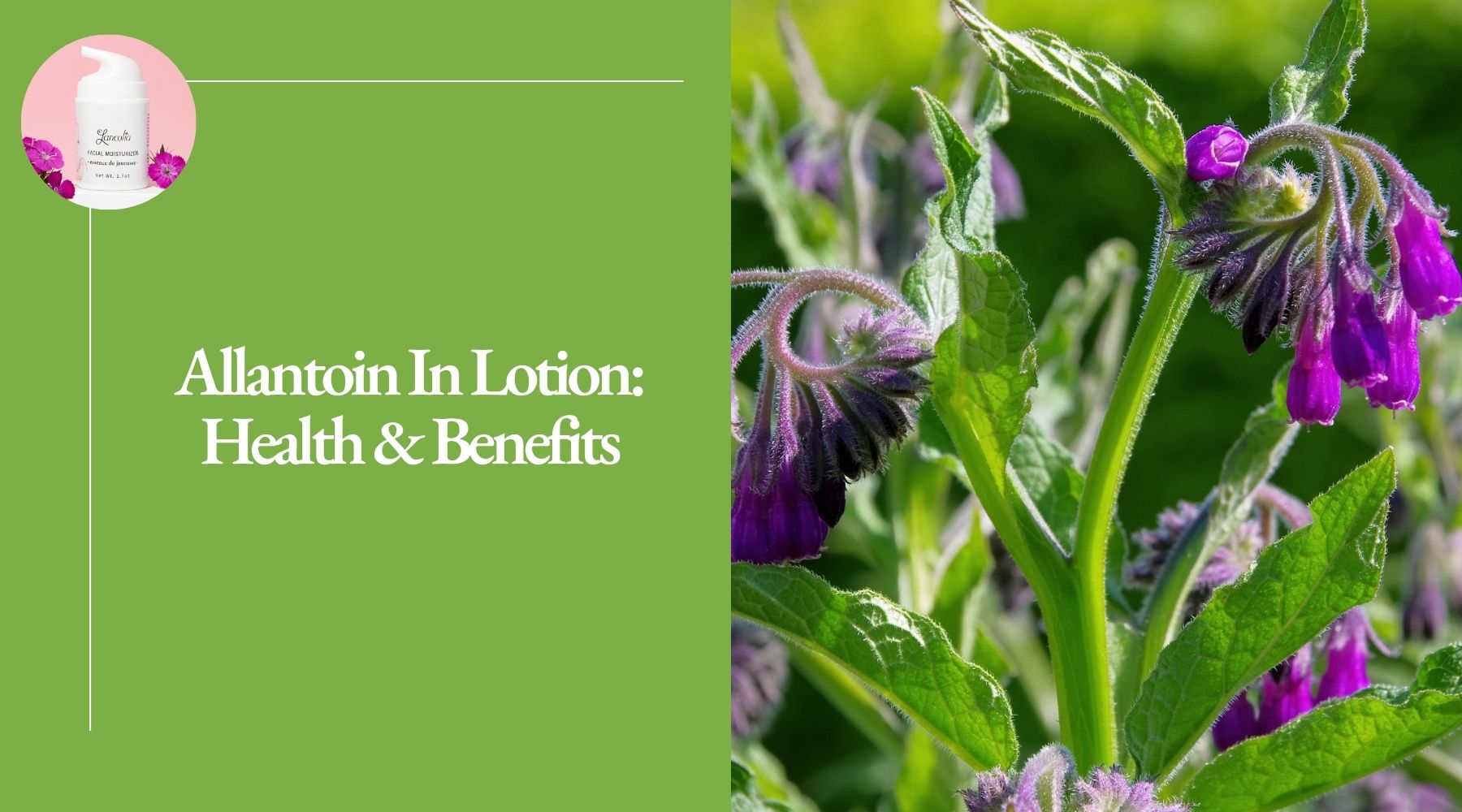
Allantoin In Lotion: Health and Benefits
Introduction to Allantoin in Lotion
In the ever-evolving world of skincare, few ingredients have maintained a reputation as quietly powerful as allantoin in lotion. Known for its ability to soothe, repair, and moisturize, allantoin is increasingly recognized as a must-have for those seeking healthy, resilient skin. This article explores the science and benefits of allantoin, focusing on how this under-the-radar ingredient elevates body lotions into daily skin therapy.

What Makes Allantoin a Skincare Star?
Allantoin is a dermo-active compound widely praised for its skin-conditioning properties. What sets it apart is its multitasking nature—offering hydration, soothing effects, mild exfoliation, and barrier repair—all in a single ingredient. It does all this gently, making it ideal even for sensitive skin.
Understanding Allantoin: Origins and Composition
Naturally found in the roots and leaves of the comfrey plant, allantoin can also be synthesized for cosmetic use. Both natural and lab-made forms are chemically identical and equally effective. Its molecular structure, 5-ureidohydantoin, allows it to promote tissue regeneration and water retention in the skin.
Allantoin Structure
Why Use Allantoin in Lotions?
Lotions are often applied generously across the body, making them ideal vehicles for delivering functional skincare ingredients. Allantoin, when used in lotion form, distributes evenly and works synergistically with emollients and humectants to enhance hydration, repair minor irritations, and support barrier integrity.
How Allantoin Works on the Skin
Allantoin stimulates keratinocyte proliferation—the production of new skin cells—while gently sloughing off dead ones. It also forms a protective film over the skin, reducing trans-epidermal water loss (TEWL), which helps lock in moisture and shield against environmental stressors.
Allantoin Lotion Benefits: A Complete Breakdown
Deep Hydration Without the Grease
Unlike heavy occlusives, allantoin doesn’t leave behind a sticky residue. It hydrates by increasing the water content of the extracellular matrix, giving skin a plump, supple appearance without clogging pores or feeling oily.
Soothing Sensitive and Reactive Skin
Allantoin acts as an anti-irritant, reducing skin reactivity to environmental triggers or allergens. It calms itchiness and redness, making it suitable for conditions like eczema or post-shaving irritation.
Helping Skin Heal: Allantoin as a Recovery Booster
By promoting cellular regeneration and enhancing fibroblast activity, allantoin supports faster healing of minor cuts, scrapes, and burns. It’s often used in after-sun or post-treatment lotions to accelerate skin recovery.
The Gentle Exfoliating Power of Allantoin
Allantoin exhibits keratolytic activity, meaning it helps soften and shed the outermost layer of dead skin. This gentle exfoliation smooths the skin's texture and allows other active ingredients to penetrate more effectively.
Allantoin and Skin Barrier Support
A strong barrier is essential for healthy skin. Allantoin fortifies the stratum corneum (outermost skin layer) by enhancing moisture retention and supporting lipid repair, which is crucial for preventing dryness and sensitivity.

Reducing Redness and Calming Inflammation
Thanks to its anti-inflammatory properties, allantoin can reduce visible redness and subclinical inflammation caused by over-exfoliation, pollution, or harsh weather. It soothes the skin without interfering with its natural repair cycle.
Softening Rough, Dry Patches with Allantoin
Areas like elbows, knees, and heels often become rough and scaly. Allantoin works to retexturize these zones, softening keratin buildup while moisturizing deeply, leading to visibly smoother skin over time.
Can Allantoin Lotion Help with Acne-Prone Skin?
Yes. While not an acne treatment per se, allantoin's soothing, non-comedogenic, and anti-inflammatory nature makes it ideal for supporting skin affected by acne. It reduces irritation from active ingredients and helps fade post-inflammatory marks.
The Role of Allantoin in Fading Scars and Blemishes
Allantoin supports tissue regeneration, making it helpful in diminishing the appearance of superficial scars and blemishes. Its mild exfoliating action also encourages turnover of discolored or uneven skin layers.
Is Allantoin Good for Anti-Aging? Here’s What We Know
Though not classified as a peptide or retinoid, allantoin contributes to anti-aging efforts by maintaining hydration, supporting collagen matrix integrity, and smoothing fine lines caused by dehydration or irritation.

Allantoin Lotion for Daily Use: When and How Often
Daily application, either morning or evening, is ideal. Apply right after bathing to maximize moisture retention. For targeted concerns like dry patches or irritation, reapply as needed throughout the day.
What Skin Types Benefit Most from Allantoin Lotions?
Allantoin is suitable for all skin types, but particularly beneficial for:
- Sensitive skin
- Dry or flaky skin
- Post-treatment skin
- Oily skin needing lightweight hydration
- Aging or mature skin
What to Avoid When Using Allantoin in Lotions
Avoid pairing allantoin with strong exfoliants like AHAs/BHAs in the same product, as this may increase skin sensitivity. It’s best to use them at separate times or in alternating routines.
Common Ingredients That Pair Well with Allantoin
Allantoin shines alongside:
- Panthenol: for enhanced healing
- Glycerin: for hydration
- Niacinamide: for barrier repair
- Oils: for reinforcing the lipid layer
Can You Use Allantoin Lotion on the Face?
Yes, allantoin lotion can be safely used on facial skin. It’s particularly effective after exfoliation or treatments like retinoids or peels.
Allantoin in Hand and Body Lotions: Everyday Relief
Frequent hand washing, sanitizing, and environmental exposure lead to dry, cracked skin. Allantoin-enriched lotions provide quick relief, healing micro-tears and locking in moisture without greasiness.
Allantoin for Rough Elbows, Knees, and Heels
For areas with persistent roughness or hyperkeratosis, allantoin helps loosen thickened skin and encourages healthy turnover, making these spots visibly smoother with regular use.
Is Allantoin Lotion Safe During Pregnancy?
Yes. Allantoin is non-toxic, non-teratogenic, and considered safe during pregnancy. However, always check full ingredient lists to avoid other restricted substances.
How to Maximize the Benefits of Allantoin in Lotion
Apply to damp skin after showering to lock in hydration. Use regularly and pair with gentle cleansing to avoid disrupting skin barrier function. Combine with SPF during the day to protect renewed skin.
Final Thoughts: Why Allantoin Lotion Belongs in Your Routine
Allantoin is a multi-functional, low-risk skincare ingredient with scientifically supported benefits. Its inclusion in lotions offers hydration, healing, exfoliation, and anti-inflammatory support—all without irritation. For skin that feels softer, calmer, and more resilient, allantoin in lotion is an essential upgrade to your body care routine.
Frequently Asked Questions
Can allantoin lotion help with eczema or very dry skin?
Yes, allantoin in lotion is highly effective for managing eczema and chronic dryness. It delivers deep hydration, softens rough patches, and supports the skin’s natural repair process—making it ideal for sensitive, flaky, or compromised skin.
Is allantoin good for healing scars and blemishes?
Absolutely. One of the top allantoin lotion benefits is its ability to promote cell regeneration. Over time, this helps fade scars, post-acne marks, and uneven skin texture by accelerating the natural exfoliation and renewal process.
Can allantoin lotion calm red, inflamed, or itchy skin?
Yes. Allantoin is a proven anti-irritant with calming properties. It soothes redness, reduces inflammation, and relieves itchiness—making it perfect for reactive skin or areas aggravated by weather, shaving, or exfoliation.
Learn More: Explore Lancolia’s Allantoin-Enriched Body Care
Lancolia’s lotions are crafted with science-backed ingredients that nourish skin from the inside out. Our allantoin-enriched formulas embody our philosophy of skincare that is effective, elegant, and gentle. We believe in simplifying beauty with purposeful formulations—no fluff, no gimmicks. Just results you can feel.
Explore our body care collection, enriched with allantoin, to restore hydration, support skin recovery, and reveal a smoother, more radiant you. Shop now and discover what your skin has been missing.

References
Thornfeldt, C. (2005). “Cosmeceuticals containing herbs: fact, fiction, and future.” Dermatologic Surgery, 31(7 Pt 2), 873–880.
U.S. Food and Drug Administration. (FDA Monograph for Skin Protectant Drug Products). https://www.ecfr.gov/current/title-21/chapter-I/subchapter-D/part-347
Rivas, M. O., & Zelickson, B. D. (2004). “Moisturizers: what they are and a practical approach to product selection.”
International Journal of Toxicology (2010). “Safety Assessment of Allantoin.” Int J Toxicol. 29(4_suppl), 84S–97S.
Lodén, M. (2003). “Role of topical emollients and moisturizers in the treatment of dry skin barrier disorders.” American Journal of Clinical Dermatology, 4(11), 771–788.
Share
